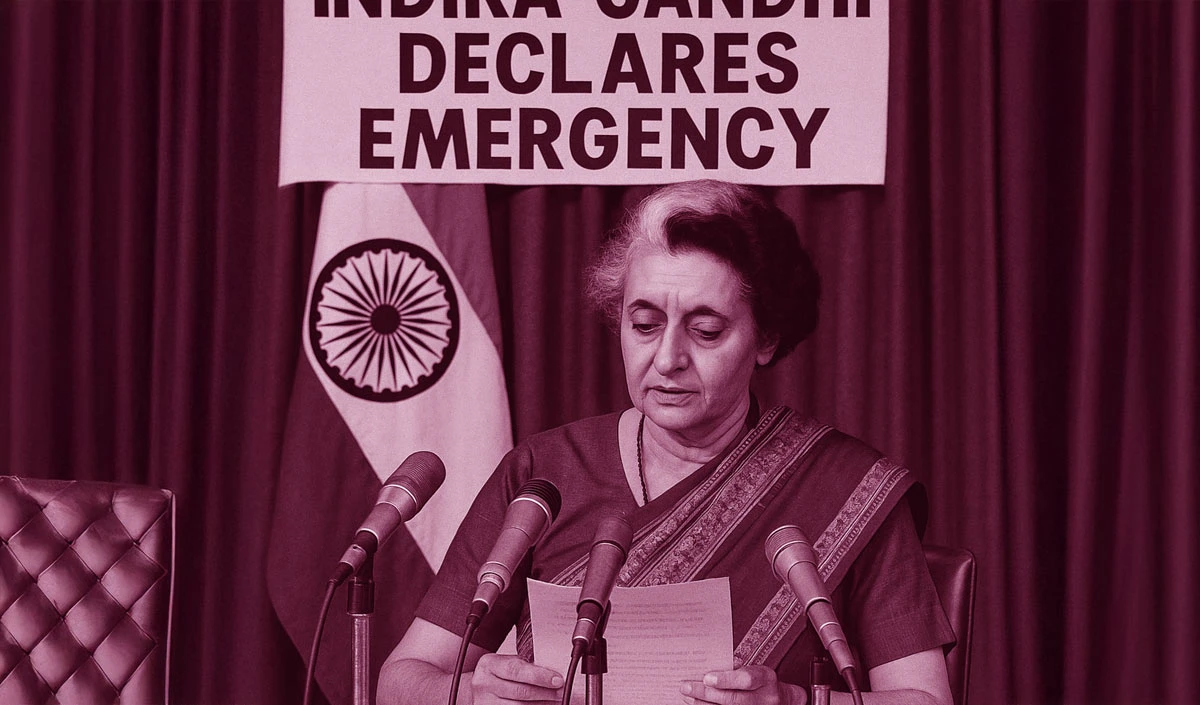On 25 June 1975, 50 years ago, the then Prime Minister Indira Gandhi announced an emergency in the country under Section 352 of the Indian Constitution. The whole country was shocked by this decision. There was a black day of democracy in Indian history. Emergency was imposed, which lasted until March 1977. During this period, democracy in India was almost abolished and a dictatorial rule was started during this period.
Indira Gandhi’s government imprisoned its political opponents, snatched the media independence, crushed the fundamental rights of the people, violated human rights and common citizens were brutally harassed and even killed. The constitution was also weakened in this period. Although every aspect of the Emergency was shocking, the atrocities on students especially were extremely condemnable. Everything just to maintain the dictatorship of a family.
Also read: 50 years of black chapter of Indian parliamentary history
For the first time there was an opportunity when Emergency was announced under Article 352 in the country. People did not even know the meaning of emergency. With the announcement of the Emergency, all the fundamental rights of the general public were taken away. Not only the right to freedom of some kind of expression, people did not have the right to life. The mediums of general public, media groups, radio, and other publicity were completely banned. Electricity supply was cut off in the offices of major newspapers within a few hours of the declaration of emergency.
After the information of the Emergency, the arrests of the leaders of the opposition had started searching in the country. The then big leaders of the time Jayaprakash Narayan, LK Advani, Atal Bihari Vajpayee, George Fernandes were imprisoned. Along with opposition leaders as well as all the people with ideology and general public, in contrast to the opposition leaders, were also filled in jail, there was no place left in jails. About 1,40,000 people were made a political captive without any hearing during the Emergency.
There is no doubt that the control of the entire country was in the hands of the Gandhi-Nehru family during the Emergency. The Congress did all the work under the guise of Emergency which was not only indecent in political terms but also inhuman. Criticizing the government or emergency in the press had come under the category of crime. Censorship was also imposed on press-media. The censor officer was deployed in every newspaper. The situation was that only after the permission of the Congress -backed officer, a news could be printed. The arrest was being made without any hearing on printing anti -government news.
Not only this, 26 organizations opposing the Congress were also banned. On 4 July 1975, the Rashtriya Swayamsevak Sangh, an organization working for national views and Indianness, was banned. Film actors, who were an outspoken critic of the Emergency, also had to bear the brunt of it. Kishore Kumar’s songs were banned from playing radio and Doordarshan. Dev Anand also faced informal ban.
There were many tragic incidents after the implementation of Emergency in the country. The Turkman Gate scandal in Delhi was also one of them. The Muslim -dominated area was evacuated by Sanjay Gandhi in the name of beautification of Delhi. This work was not forcibly done with the consent of the people. People’s houses were demolished by bulldozers. Those who protested were stunned in jails. During the protest, the police rained sticks and released tear gas shells. The police also fired bullets. Four people lost their lives.
Due to the craze of Sanjay Gandhi, beggars, slums and passers -by were forcibly completed and forcibly sterilization targets were to be completed. On 18 October 1976 in Muzaffarnagar, Uttar Pradesh, the police fired directly on the agitators opposing the sterilization campaign. In which 42 innocents were killed. Shaheed Chowk remains here in memory of the dead. According to a report, during the Emergency, more than 1 crore 10 lakh people were sterilized across the country.
After 21 months, Jayaprakash’s movement reached the decisive position. Indira Gandhi had to leave the throne. The government of Morarji Desai formed the Shah Commission under the chairmanship of Justice JC Shah to know the excesses during the Emergency on 28 May 1977. The Shah Commission had clarified in its report that neither the economic conditions in the country were bad nor there was any hurdle in law and order at the time when the Emergency was announced. Indira Gandhi had imposed an emergency in the country as per her wish and in this regard, she did not discuss with any colleagues except some people of her party.
Most of the respected and elderly leaders arrested during the Emergency required medical facilities, which they were not present in the hospital. A sample of Indira Gandhi’s dictatorship also shows that the Shah Commission had greatly criticized the government’s attitude on the sterilization program. The Commission had said that it was made mandatory to show sterilization certificate for renewal of driving license of auto rickshaw drivers along with forced sterilization of beggars. The Commission had clearly admitted that this entire emergency was used to benefit some people using the government machinery.
In January 2011, the Supreme Court admitted during the hearing of a case that in the year 1975, the fundamental rights of citizens were violated during the Emergency. The then Attorney General Neeran Dey confessed in the Supreme Court that the right to live was postponed. A white paper was presented in Parliament on 1 August 1977 regarding the position of the press during the Emergency. It was clear from the white paper of the Satya C page that Indira Gandhi, who wishes for dictatorship, had decided to dissolve the press council and unite the four news agencies, which would make them easier to censors and handle.
Rahul Gandhi and the leaders of the Congress party who have been talking about saving democracy often in the past. They roam from Parliament to the road with the book of constitution, reminding them that the leader of his party had taken up this country and put 21 months of emergency and put people in jail. Actually, the Emergency imposed in 1975 was not the fault of Indira Gandhi, but the “ego” of Indira Gandhi. On December 2024, Prime Minister Narendra Modi mentioned the Emergency in the House and said, “Whenever there is a discussion of democracy in the world, this stigma will never be eradicated from the forehead of the Congress because democracy was strangled. An attempt was made to mix the penance of the Indian Constitution makers into the soil. ‘
-Dr. Ashish Vashistha
(freelance journalist)

